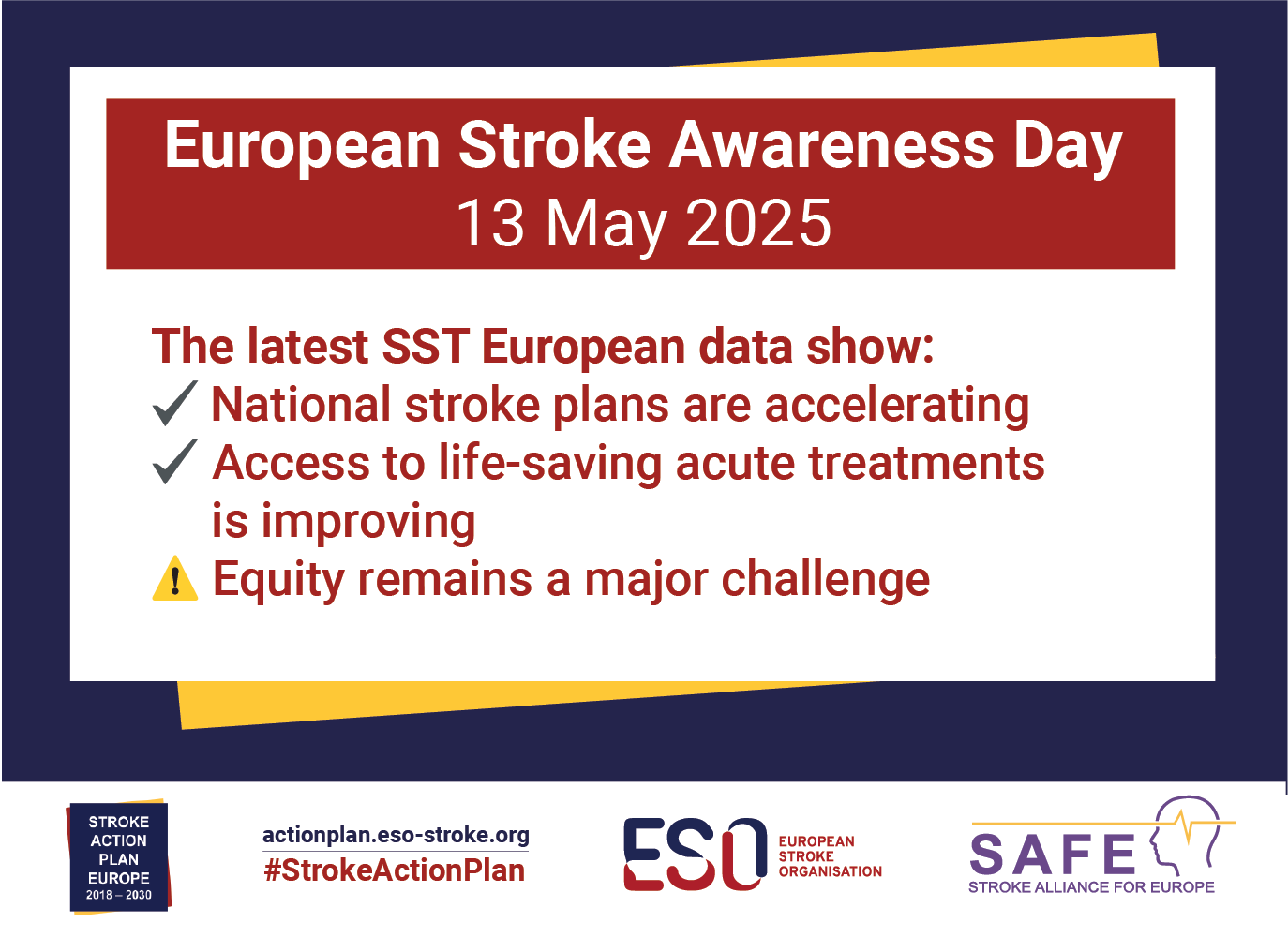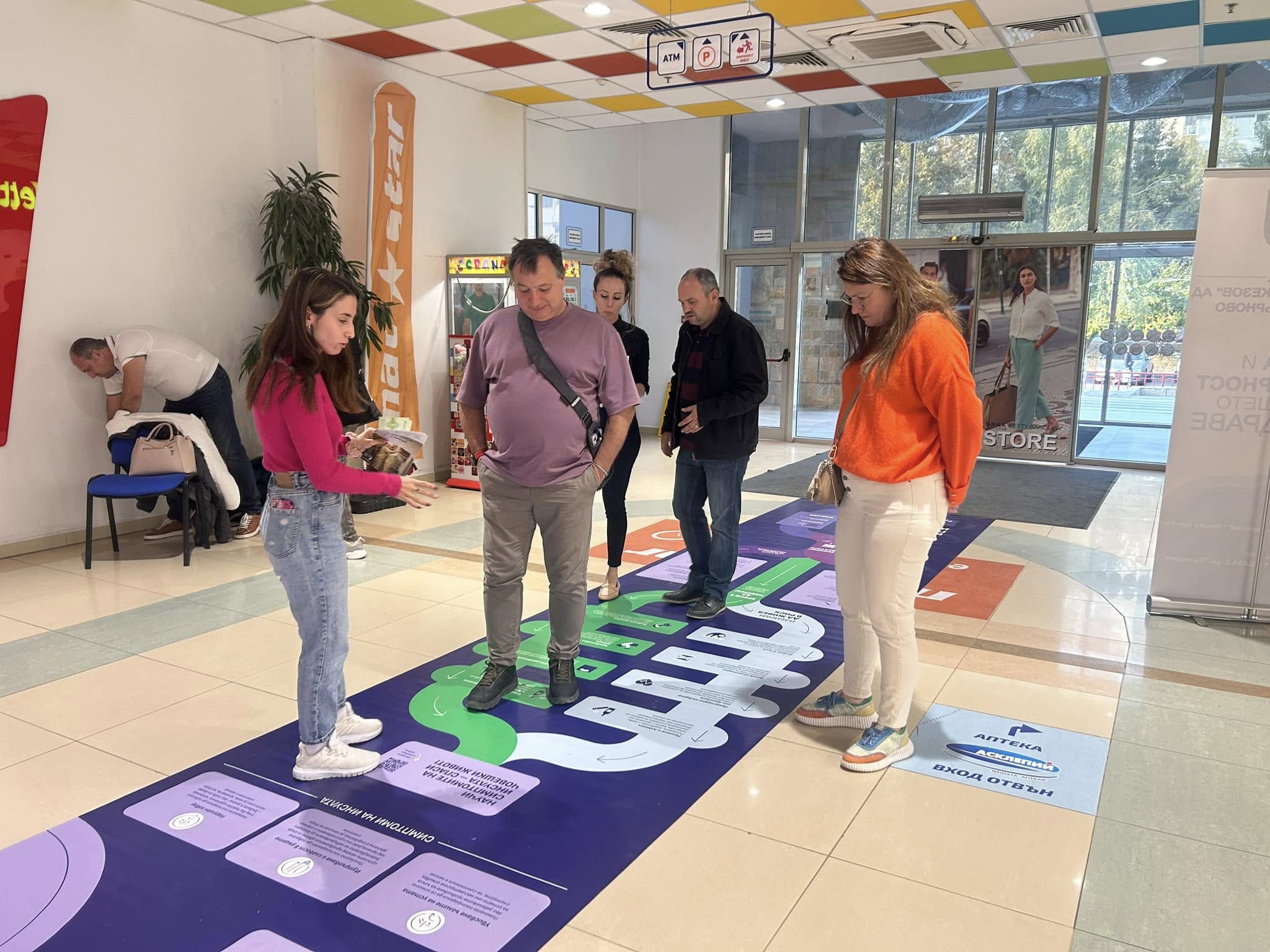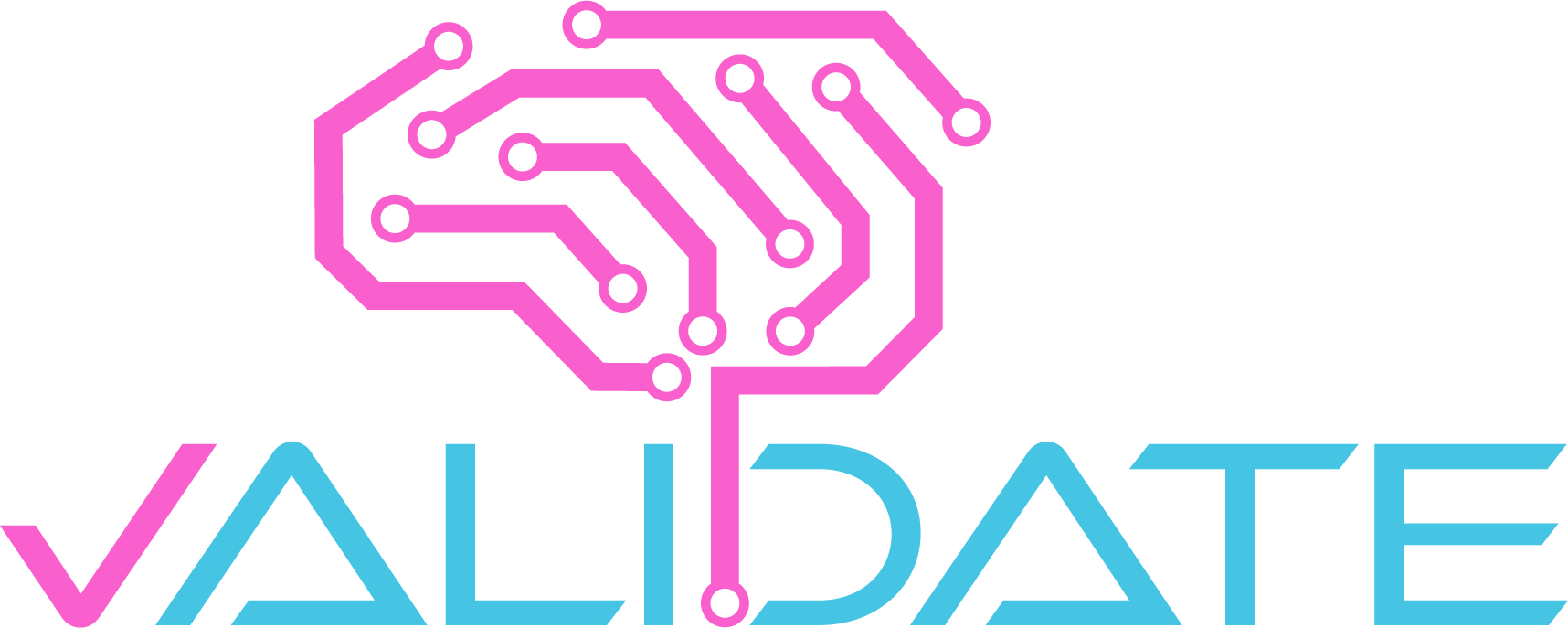
May 13, 2025
The 2023 Stroke Services Tracker data shows progress in stroke care planning and treatment access, but persistent disparities demand urgent attention.
New data from the Stroke Action Plan for Europe’s 2023 Stroke Service Tracker, launched today, show encouraging progress in stroke care across Europe – but also highlight serious inequalities that urgently need to be addressed.
A total of 47 countries contributed to the latest dataset, providing the most comprehensive picture yet of stroke care across the continent. The findings show improvements in national planning, emergency treatment and prevention. However, too many people who have had a stroke still face major challenges in accessing the care, rehabilitation and follow-up they need.
Stronger national commitment to stroke care
There is growing political commitment to tackling stroke. The number of countries with a national stroke plan has risen from 16 in 2022 to 24 in 2023, with 16 more countries currently developing one. Importantly, 30 countries now involve Stroke Support Organisations in shaping national stroke strategies and guidelines, ensuring people with lived experience have a voice in how care is delivered. Lithuania, Poland and Slovakia have recently joined this effort.
Programmes aimed at preventing stroke are also becoming more common. Lithuania, Sweden, the Netherlands and Germany are among the countries that have launched or expanded national prevention efforts in the past year, bringing the total to 23.
Improved access to life-saving treatment – but too slowly
Access to key emergency treatments for ischaemic stroke (which happens when a blood clot or blockage stops blood flow to parts of the brain) is improving, but unevenly. On average, 15.4% of eligible patients received clot-busting drugs (intravenous thrombolysis), and 5.9% underwent mechanical thrombectomy – a procedure to remove a clot directly from the brain.
Seven countries have now met the European benchmark of giving thrombolysis to at least 20% of patients, and 14 have reached the target of delivering thrombectomy to over 7.5%, based on high-quality data. Five more countries hit this goal using data of lower quality.
However, delays in treatment remain a major problem. Only seven countries managed to achieve the recommended ‘door-to-groin’ time – the time from arrival in hospital to starting thrombectomy – of 60 minutes or less. In 12 countries, this delay was over 90 minutes, reducing the chances of a good recovery.
Ongoing challenges in stroke unit care, rehabilitation and follow-up
Despite some progress, the organisation of stroke services and monitoring of quality still fall short in many areas. The goal of admitting at least 90% of stroke patients to a specialist stroke unit is only met in nine countries with reliable data. In contrast, some countries admit fewer than one in four patients to stroke units – and others don’t collect this data at all.
Only 22 countries monitor the quality of stroke unit care. The picture is even more concerning when it comes to rehabilitation after hospital discharge. Just 11 countries have systems in place to monitor the quality of rehabilitation services.
Early rehabilitation is available in stroke units in 22 countries (although data quality is low in eight). However, there has been little progress in ensuring patients have a rehabilitation and care transition plan which are essential for continued recovery. Just five countries systematically monitor whether such plans are given, while 14 estimate that they are provided, but without proper tracking.
Follow-up care after stroke also varies widely. Only 11 countries report that at least 90% of patients receive follow-up and just four countries offer structured follow-up that meets recognised standards.
Prevention of further strokes and improving patient outcomes
Preventing another stroke is crucial – nearly one in four strokes happens in someone who has already had one. But across Europe, there is little data on how well countries are doing in providing secondary prevention, or how many patients are getting the medication and support they need. This makes it difficult for policymakers to know where to act.
These inequalities in care are reflected in outcomes. In some regions, death rates within 30 days of stroke remain worryingly high, pointing to major differences in access to emergency treatment, rehabilitation services and longer-term support.
Life after stroke: support remains limited
Only 13 countries report having a dedicated national programme for life after stroke. While many address important aspects of recovery, support remains inconsistent. Twelve countries include ongoing health management in their programmes, while 10 focus on emotional adjustment and mental wellbeing. Eleven countries offer support for everyday activities and practical challenges, and an equal number provide information and guidance for both stroke survivors and their carers.
A call to action: bridging the gap between potential and practice
“The 2023 Stroke Service Tracker data show that while momentum is building in some areas – particularly in national planning and access to acute therapies – major gaps in organisation, delivery and equity of stroke care persist,” said Professor Hanne Christensen, Chair of the Stroke Action Plan for Europe. “There is no room for complacency. Countries must take these insights and act decisively to bring data collection and stroke care up to the standards that every person affected by stroke deserves.”
Arlene Wilkie, Director General of the Stroke Alliance for Europe (SAFE), added: “It is unacceptable that in 2023 we still see such wide disparities in access to stroke unit care, early rehabilitation and life after stroke support. Stroke survivors need holistic and continuous care. We call on all national governments and policy makers to do better in providing the essential services required for all those affected by stroke.”
Professor Simona Sacco, President of the European Stroke Organisation (ESO), emphasised: “The Stroke Action Plan for Europe provides countries with the framework they need to close the gap between aspiration and delivery. These data are both a roadmap and a challenge – to work smarter, faster and more equitably.”
Click to read more
About SAP-E and the Stroke Service Tracker
The Stroke Action Plan for Europe (SAP-E), launched in 2018, provides a strategic blueprint to improve stroke prevention, care and life after stroke support by 2030. The Stroke Service Tracker (SST) was developed as a monitoring tool to evaluate Europe’s progress against the SAP-E targets, providing valuable insights for national stakeholders to drive improvements.
Europe faces over 1.1 million strokes each year, causing nearly 460,000 deaths. Nearly 10 million people live with stroke’s long-term effects. The economic burden is immense – €60 billion in 2017 – and is projected to rise to €86 billion by 2040 without urgent reform.
The SST continues to be a vital instrument for mapping progress and exposing areas where countries fall short. It is a call for action, innovation and investment to ensure every stroke survivor in Europe has access to high-quality, timely and equitable care – no matter where they live.

Apr 23, 2025
SAFE met with SAFE board member Dorina Dobreva, founder and chair of the board for Association for Stroke and Aphasia (Bulgaria) and Dr. Georgi Georgiev, Vice President for Association for Stroke and Aphasia, to talk about their 2024 campaign for World Stroke Day
Every year on 29 October, World Stroke Day provides a global spotlight on stroke. For the Association for Stroke and Aphasia (ASA), this annual event is more than a date on the calendar – it is a call to action.
Why ASA chose to join the global movement
Although ASA is still a young organisation, founded in 2020, it sees involvement in international stroke campaigns as a vital responsibility. The team believes that raising awareness and sharing knowledge can make a real difference – even save lives.
“Although we are a relatively new stroke support organisation, we believe that our involvement in international stroke organisations such as the World Stroke Organisation and SAFE is a societal responsibility,” the organisation’s founder and chair of the board Dorina Dobreva explains. “It compels us to work towards enhancing the health skills of everyone in Bulgaria.”
From its inception, ASA has actively participated in World Stroke Day campaigns. For them, joining this global fight is a step toward building a healthier and more hopeful future.
Planning with purpose: setting goals and KPIs
When planning for the campaign, the team examined their stroke statistics in Bulgaria. They were alarmed by the growing number of young people experiencing strokes and the lack of action from policymakers.
“We decided to focus our 2024 campaign on spreading essential knowledge about stroke,” explains Dorina. “Its nature, risk factors, symptoms, and most importantly, how to act when it happens.”
This is where the team saw its greatest potential for impact: by improving public knowledge to help more people recognise stroke symptoms and seek treatment quickly to receive thrombolysis treatment (IVT).
“One proven way to change the pessimistic stroke statistics in Bulgaria is by improving access to IVT stroke treatment and therefore reducing disability as well as the social costs to the country as a whole.”
Key performance indicators included:
- The percentage of ischaemic stroke patients who received IVT (thrombolysis) within the treatment window
- The annual percentage of IVT-eligible patients compared to treatment rates across leading neurological departments
Inside the campaign
The 2024 campaign carried a clear message: “Be Prepared! Recognise The Stroke. Act Fast!”
One of the centrepieces was the “Pathway of knowledge” – a 7-metre interactive installation that gave people a hands-on way to learn about stroke in just minutes. Along the path, QR codes linked to deeper resources. At the end, participants could take a quick online quiz and even snap a selfie in support of the cause.
“Each person who has passed the ‘Pathway of knowledge about stroke’ will have all the information they need to save someone’s life,” says Dr. Georgi Georgiev, the organisation’s Vice President.
Other campaign features included:
- A new Stroke infobot on Viber, offering instant access to stroke information
- A dedicated National support line for stroke survivors and carers
- Multiple educational videos (30 seconds to 2 minutes) shared across TV, social media and public displays
- Consistent campaign visuals aligned with ASA’s brand and global stroke awareness imagery, shared across banners, press releases, and websites
Working with institutions and partners
Another impactful initiative was a series of expert-led events titled “Stroke – A look into the black box.” These national discussions brought together doctors, emergency services, policymakers, media and stroke survivors to map out the full stroke care journey – from the moment symptoms appear to hospital treatment. The message was clear: no one organisation can fix this alone.
“At every meeting, all the experts agreed: the lack of public knowledge is a major issue. It delays emergency calls and transport to stroke centres, costing lives. We need to work together to do better” Georgi explains.
With long-standing support from the Municipality of Sofia, the team achieved two additional important wins:
- Their stroke awareness video would now be displayed year-round, not just twice a year.
- Trams and trolleybuses in Sofia with digital displays showed the video during the World Stroke Day campaign.
Extending activities to the whole of Bulgaria
The campaign was not limited to the capital, activities reached towns and cities across the country, including:
- The “Pathway of knowledge” interactive installation in various public spaces
- Educational videos and visual content shared online and through traditional media
- Print materials, QR code resources and community-led information sessions
Wherever possible, people were encouraged to share photos of themselves at the end of the pathway to show support and spread the message further.
Mobilising volunteers
In 2024, the team faced a challenge – their usual partners at the Red Cross were unavailable to assist during the campaign. Undeterred, the team turned to friends, carers and stroke survivors for help.
“Many people joined us, especially during the ‘Pathway of knowledge’ events,” says Dorina. “Caregivers and medical experts also played a key role in spreading the word.”
The campaign’s national launch, held at Serdika Mall, was opened by ASA’s President and broadcast live on National Television.
What were the results?
Early signs are encouraging. Awareness is growing, more health professionals are taking part, and thousands have already visited the ‘Pathway of knowledge’. The campaign’s coverage is expanding, and public engagement is rising. Still, Dorina acknowledges that some results will take time.
“To truly understand the campaign’s impact, we will need to evaluate data mid-2025. This work will continue for years – but we are committed.”
Why create a campaign report?
ASA believes in transparency, responsibility and continuous learning. Documenting their efforts helps ensure that each campaign builds on the last.
“Achieving remarkable results is vital – but so is the process of getting there,” Georgi explains. “We want to demonstrate our capacity and innovation as a stroke support organisation. But more importantly, we want to stay aligned with values like honour, dignity, and mutual respect.”
Through clear goals, strategic action and a community-driven spirit, the team at ASA continues to push forward – building a stroke-aware Bulgaria, one step at a time.
Click to download the report here.
Contact Dorina to find out more: info@stroke.bg

Mar 19, 2025
The Neurological Conditions campaign launched last week during Brain Awareness Week, highlighting the latest innovations in brain health and neurological treatment. This campaign showcases the researchers, healthcare professionals and organisations driving progress in neurology, developing cutting-edge treatments and improving patient outcomes.
At SAFE, we are committed to raising awareness of the challenges stroke survivors face and advocating for better support and rehabilitation across Europe. That’s why we partnered with Mediaplanet on this initiative, ensuring life after stroke remains a key focus in the conversation around neurological care.
Click to read the article by our Director General Arlene Wilkie
Click to read

Mar 15, 2025
On Brain Awareness Week’s sixth day we are focusing on Validate, an EU Horizon research project which is using AI to revolutionise stroke treatment by analysing patient data and helping doctors make faster, more informed decisions. A huge part of this project is ensuring that AI is trustworthy, safe, fair and reliable before its widespread hospital use.
AI’s role in stroke treatment
Over one million people in the EU suffer from ischemic strokes each year. Treatments like mechanical thrombectomy (removing the clot) and intravenous thrombolysis (dissolving the clot with medication) can be lifesaving, but their effectiveness varies based on factors like time since the stroke, patient age, health problems and genetics can affect the outcome. VALIDATE is developing an AI tool to help doctors select the best treatment for each patient.
Ensuring AI is Safe and Fair
To make AI a reliable medical tool, VALIDATE focuses on:
- Training AI with diverse data to reduce bias
- Collaborating with doctors, AI experts and patients
- Following EU safety and ethical regulations
- Continuously testing for accuracy and reliability
Dr. Riana Mutua from the Berlin Institute for Health stresses the need for interdisciplinary collaboration:
“Ensuring AI is trustworthy in healthcare requires more than just technical excellence. At VALIDATE, we work closely with doctors, patients and AI developers while following strict ethical and regulatory guidelines. By combining expertise across fields, we will create an AI system that doctors can trust – one that truly benefits patients and leads to more informed treatment decisions.”
Arlene Wilkie, Director General of the Stroke Alliance for Europe (SAFE), highlights the importance of patient involvement:
“It is essential that stroke survivors have a voice in the development of AI tools that will impact their care. Through VALIDATE, we ensure that this technology is designed with both patients and clinicians in mind. AI should not only support doctors in making better decisions but also improve outcomes and quality of life for those affected by stroke.”
By prioritising safety, fairness and patient-centered design, VALIDATE is paving the way for more personalised, effective and trustworthy AI-assisted stroke care.
Click to view video about how Validate makes AI safe
Or click to visit the Validate website

The VALIDATE project receives funding from the European Commission’s Horizon Europe Programme under grant agreement number 101057263.










